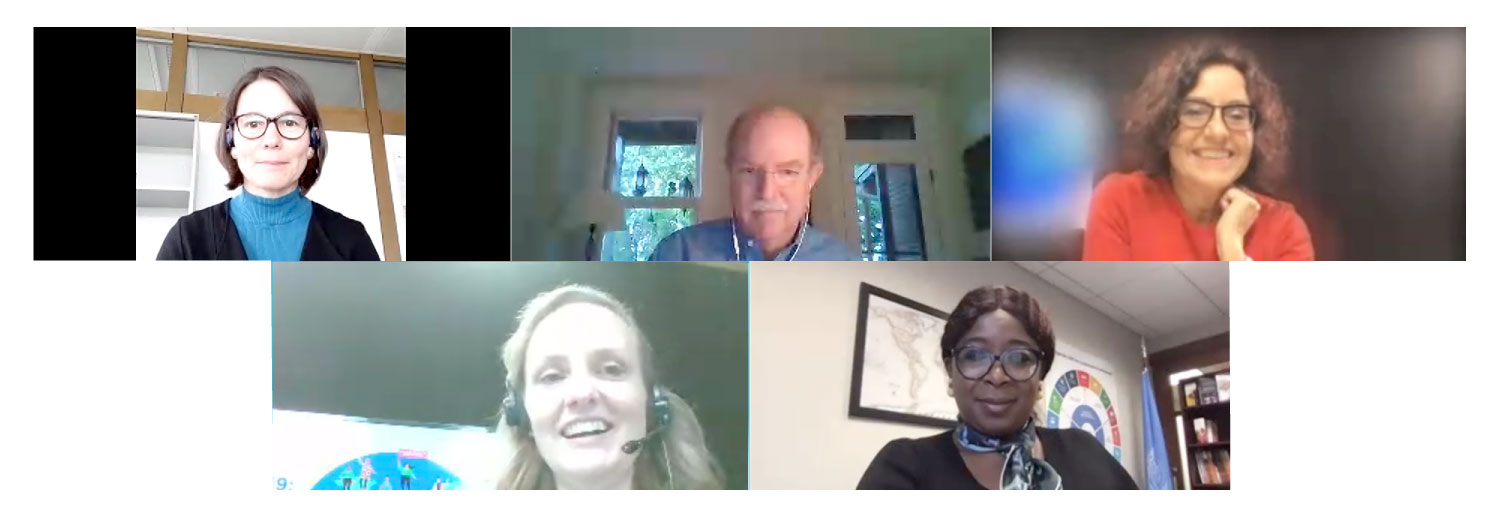Outlook Session:
SRHR and COVID-19 – Where do we go from here?
On the event’s second day, delegates came together for an outlook session around the issue of how sexual and reproductive health and rights (SRHR) can be advanced in times of COVID-19.
The session started with a short outlook panel discussion featuring three speakers:
- Diene Keita, Deputy Executive Director, Programme, United Nations Population Fund (UNFPA)
- Birgit Pickel, Deputy Director General German Federal Minister for Economic Cooperation and Development (BMZ)
- John Skibiak, Director Reproductive Health Supplies Coalition (RHSC)
Delegates were then invited to join a “fishbowl discussion” which featured the three speakers on the panel plus an additional vacant “virtual chair”, filled by delegates on a rotating basis who wanted to share their opinion or ask questions. The online format did not detract from the liveliness of the ensuing discussion, which covered the following key issues:

The need to think beyond the health sector
COVID-19 has curbed gender equality and existing inequalities further. It’s therefore important to think beyond the health sector, in order to realize SRHR. Issues such as education, economic development, gender equality and social safety nets that provide access to necessary services must be considered. Addressing the delegates, Birgit Pickel, Deputy Director General German Federal Minister for Economic Cooperation and Development (BMZ), said, “If we want to succeed in ensuring access to sexual and reproductive health and rights for all girls and women, we need to think beyond the health sector”.
Strong and resilient health systems are key to ensuring SRHR in future crises
The panelists and delegates agreed that strong and resilient health systems are a cornerstone for realizing SRHR - especially during the COVID-19 crisis. This means investing in health systems strengthening and ensuring that this is at the heart of the response to COVID-19 to ensure SRHR now and in future crises.
Outlook for 2021: Challenges arising from the COVID-19 pandemic
Delegates discussed how the COVID-19 pandemic has put the health, wellbeing and self-determination of millions of girls, women and newborns at risk by limiting access to SRHR. Diene Keita, Deputy Executive Director, Programme, United Nations Population Fund (UNFPA), predicted that the accessibility and quality of services, in addition to instability due to financial hardship resulting from the pandemic, will be major challenges in 2021. Promoting SRHR will also become ever more difficult given rising levels of food insecurity, insufficient social protection, political pushback and a shrinking space for civil society.
Facing new choices and meeting new demands so SRH supplies can continue
John Skibiak, Director of Reproductive Health Supplies Coalition (RHSC), pointed out that the current crisis is forcing countries to face up to new and difficult choices that are very different to a year ago. As service delivery suddenly stopped and the demand for self-care exploded, the need for SRH commodities changed. A multitude of questions arose, including which SRH commodities to buy, when to buy them and from whom. This meant countries were suddenly faced with real financial and logistical difficulties. SRH commodities tend to be ordered when stocks are very low or when supplies have already run out. This has become a significant problem during the pandemic because of interrupted supply chains and financial problems.
The power of civil society
Delegates stressed the importance of ensuring space for and access to strong civil society institutions in order to truly realize SRHR. The COVID-19 health crisis has led to a shrinking space for civil society. Yet now, the support it can offer – through advocacy groups, schools, online communities, cultural institutions etc. – is more important than ever. Diene Keita, Deputy Executive Director, Programme, United Nations Population Fund (UNFPA), called civil society organisations “our best arms”. They have a broad reach, are able to help negotiate with the government and religious leaders and are powerful in building bridges between governments, NGOs and the community.
Challenging situations demand innovative solutions
Delegates agreed that the COVID-19 pandemic demands innovative solutions, many of which can already be seen today. New ways of distributing contraceptives and other essential SRH products are being adopted, telemedicine is being used more frequently and digital platforms are being embraced. Birgit Pickel, Deputy Director General German Federal Minister for Economic Cooperation and Development (BMZ), said she was “impressed by the innovative approaches many countries have come up with, including digital pregnancy counselling via phone and ordering of contraceptives up to your doorstep. Challenging situations demand innovative solutions.”
Safeguarding the achievements we have made so far
Many significant achievements in the area of SRHR have been made in recent years, which are now threatened by the consequences of COVID-19. To safeguard the important progress made and counteract further restrictions in accessing SRHR in light of the pandemic, close cooperation among governments, civil society, donors and international organisations is more important than ever. This is the spirit of the Global Action Plan for Healthy Lives and Well-being for all (GAP) with its key premise that stronger collaboration contributes to better health.